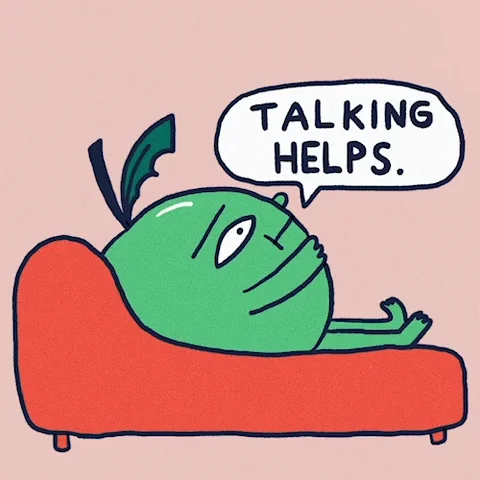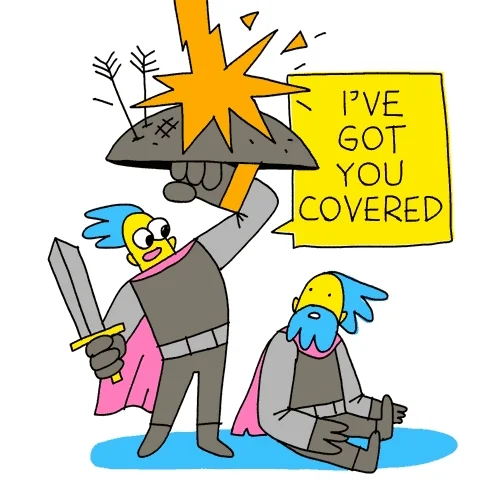Has a friend, family member, or even a stranger opened up to you about some serious thoughts they may be dealing with?
If so, you might be worried that you don't know what to do or what to say.

That's ok! I know what this feels like, and you're not alone. Explore some key steps in helping your loved ones overcome intrusive thoughts, and how you can best support them.
What Are Intrusive Thoughts?

The Mayo Clinic's textbook definition says that intrusive thoughts are "unwanted thoughts and images that can cause anxiety and distress."
So where do intrusive thoughts come from?

Many people experience intrusive thoughts that make them feel unusual or uncomfortable, like:
"Did I turn off the stove?"
"Did I lock my door?"
When standing high above the ground, thinking "What if I lost my footing and fell?" or "What if I threw my bag down there?"
Why Do Some People Get Intrusive Thoughts?
For some, intrusive thoughts are easy to let go. For others, this may be more difficult, like people living with:
OCD (obsessive-compulsive disorder)
PTSD (post-traumatic stress disorder)
GAD (generalized anxiety disorder)
Many other mental health concerns might also be associated with intrusive thoughts.
OCD

Intrusive thoughts within OCD can come in two forms:
Obsessions, where unwanted thoughts or desires are repeated. It's the more thought-based of the two forms.
Compulsions, where people perform actions to prevent these unwanted thoughts from happening. It's more action-based, like constant hand washing for obsessive thoughts about germs.
PTSD

Post-traumatic stress disorder is a mental health concern that develops after experiencing a traumatic event.
Many different thoughts and actions may be triggered in people with PTSD after re-experiencing a similar trauma. This can include intrusive thoughts that accompany flashbacks, nightmares, or anxiety.
GAD

Generalized anxiety disorder usually means that a person will consistently feel anxiety that "can interfere with daily life."
With this anxiety, some people may have regularly occurring intrusive thoughts that bother them on a regular basis.
These aren't the only reasons for intrusive thoughts, but I want to give some context for you to understand why certain people may have more challenges with intrusive thoughts.
The First Step to Help your Loved Ones: Listen Attentively!
So, a loved one approaches you for help with their intrusive thoughts. First, make sure to listen!

In my experience, the person sharing their intrusive thoughts with you is struggling to express these thoughts. They may be scared of judgment and rejection, or hurt by previous trauma.

Yes! Your loved ones will appreciate that you've given them your time, and that you're with them just by listening. They need silence from their thoughts, so listening and offering silence is helpful.
The Second and Hardest Step: Having a Discussion!
If your loved one is comfortable, talk with them once they're done sharing.
This is a hard step! Remember to be kind.

In your discussion, make sure to:

Ask them if they have anything else to share. Be patient, as they might be gathering the courage to share more.

Ask them if they'd like to talk about their thoughts.

Ask how the thoughts make them feel or when the thoughts come.

Be attentive! If a question bothers them, don't bug them about it.
Quiz
Bob is having intrusive thoughts about his self-image. He approaches his brother Billy to describe these thoughts. What should Billy do first?
The Last Step: Stay by Their Side!
It's comforting to know that your loved one loves you back and trusts you with their thoughts and fears. Don't let them fight this battle alone!

There are a few things you can do to stick with your loved one:

Set aside time to check in on them by calling, texting, or seeing them in person to see how they are.

Ask open-ended questions to facilitate discussion.

Don't make them second guess their thoughts by diagnosing them. Try not to jump to conclusions, and if you feel your loved one may need more help, refer them to a professional.
When Should I Refer My Loved One to a Professional?
 It's hard to know when to refer your loved ones to a professional, especially when you aren't a mental health professional.
It's hard to know when to refer your loved ones to a professional, especially when you aren't a mental health professional.
Generally, if your loved one experiences these intrusive thoughts for many weeks and months, you should recommend that your loved one visit a professional.

How can I support my loved one if I'm not a mental health professional?
You can do many things, like:
walking their dog
going to get groceries together
attending doctor or therapy appointments together
simply sharing a meal together

What if this is an emergency?
Conversations with mental health concerns can escalate very quickly. Support them by searching for emergency support immediately if your loved one:
has caused themself harm
is having suicidal thoughts
is placing themself or others at immediate risk of being hurt
You can find a list of various helplines in many countries here. 👈
Take Action
These steps are hard, especially because every conversation and situation is unique. What works for one person may not work for another, but what's most important is that you want to help.

Check out these tips for more information:
Your feedback matters to us.
This Byte helped me better understand the topic.
